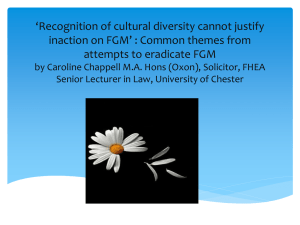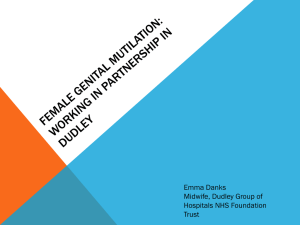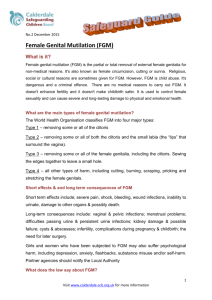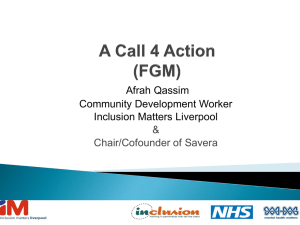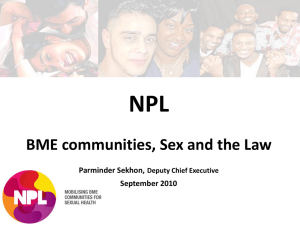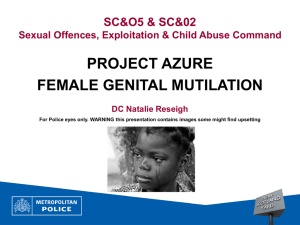Safeguarding FGM Policy Statement
advertisement
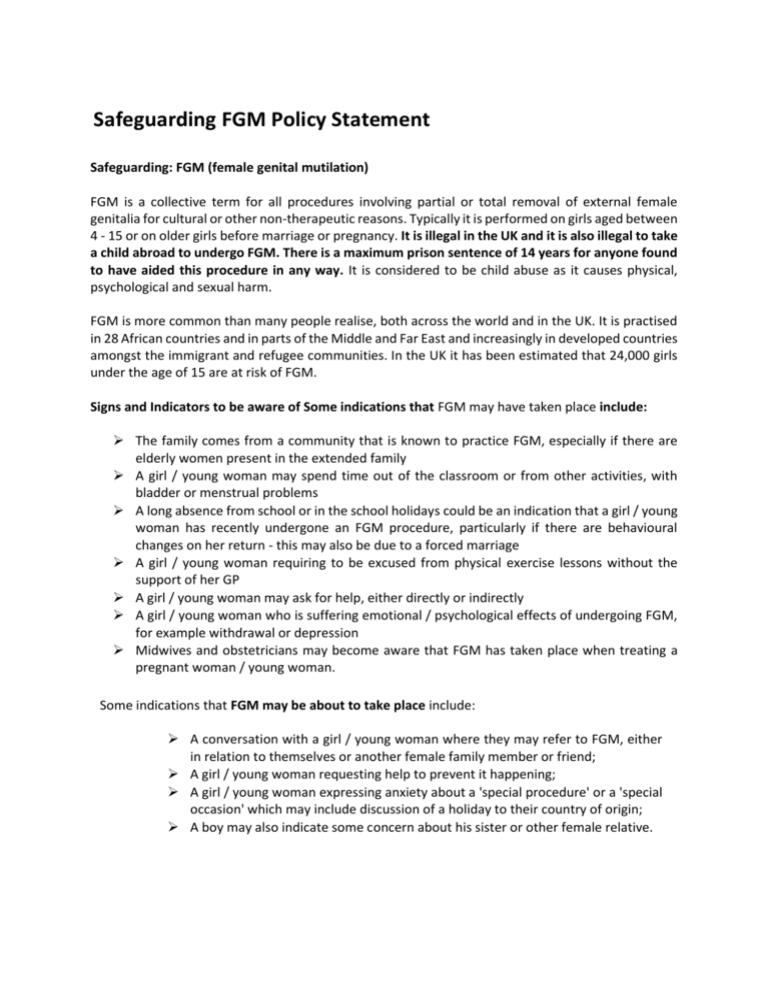
Safeguarding FGM Policy Statement Safeguarding: FGM (female genital mutilation) FGM is a collective term for all procedures involving partial or total removal of external female genitalia for cultural or other non-therapeutic reasons. Typically it is performed on girls aged between 4 - 15 or on older girls before marriage or pregnancy. It is illegal in the UK and it is also illegal to take a child abroad to undergo FGM. There is a maximum prison sentence of 14 years for anyone found to have aided this procedure in any way. It is considered to be child abuse as it causes physical, psychological and sexual harm. FGM is more common than many people realise, both across the world and in the UK. It is practised in 28 African countries and in parts of the Middle and Far East and increasingly in developed countries amongst the immigrant and refugee communities. In the UK it has been estimated that 24,000 girls under the age of 15 are at risk of FGM. Signs and Indicators to be aware of Some indications that FGM may have taken place include: The family comes from a community that is known to practice FGM, especially if there are elderly women present in the extended family A girl / young woman may spend time out of the classroom or from other activities, with bladder or menstrual problems A long absence from school or in the school holidays could be an indication that a girl / young woman has recently undergone an FGM procedure, particularly if there are behavioural changes on her return - this may also be due to a forced marriage A girl / young woman requiring to be excused from physical exercise lessons without the support of her GP A girl / young woman may ask for help, either directly or indirectly A girl / young woman who is suffering emotional / psychological effects of undergoing FGM, for example withdrawal or depression Midwives and obstetricians may become aware that FGM has taken place when treating a pregnant woman / young woman. Some indications that FGM may be about to take place include: A conversation with a girl / young woman where they may refer to FGM, either in relation to themselves or another female family member or friend; A girl / young woman requesting help to prevent it happening; A girl / young woman expressing anxiety about a 'special procedure' or a 'special occasion' which may include discussion of a holiday to their country of origin; A boy may also indicate some concern about his sister or other female relative. Action to Take if Workers Believe a Child is at Risk of FGM Report to child protection designated person and - do not delay – ring 999. If a girl / young woman is thought to be at risk of FGM, workers should be aware of the need to act quickly - before she is abused by undergoing FGM in the UK, or taken abroad to undergo the procedure. An interpreter must be used in all interviews with the family if their preferred language is not English. The interpreter must be female. Strategy Meeting / Discussion Once a referral has been received for either a girl / young woman who is at risk or has undergone FGM, a Strategy Meeting / Discussion must be convened within two working days. This should involve representatives from the police, Children's Social Care Services, and education. Relevant health care providers or voluntary / community / faith organisations with specific expertise (for example FGM, domestic violence and / or sexual abuse) should also be invited. Consideration should also be given to inviting a legal advisor. The Strategy Meeting / Discussion must first establish if the parents and / or girl / young woman have had access to information about the harmful aspects of FGM. If not, the parents / girl / young woman should be offered the opportunity of educational / preventative programmes before any further action is considered. Every attempt should be made to work with parents on a voluntary basis to prevent abuse of FGM occurring. The investigating team should ensure that parental co-operation is achieved wherever possible, including the use of community organisations and / or community leaders to facilitate the work with parents / family. However, if it is not possible to reach an agreement, the first priority is protection of the girl / young woman. Girls / Young Women in Immediate Danger If the parents cannot satisfactorily guarantee that they will not proceed with the mutilation and the Strategy Meeting / Discussion decides that as such the child / young woman is in immediate danger, then an Emergency Protection Order should be sought. The primary focus is to prevent the child undergoing any form of FGM, rather than removal from the family. If the girl / young woman has already undergone FGM, the Strategy Meeting /Discussion will need to consider whether to continue enquiries or whether to assess the need for support services. Consideration should be given to establish, if there are any younger sisters, and an assessment may be needed to determine if there are any risks to younger siblings. If any legal action is being considered, legal advice must be sought. Child Protection Conference A Child Protection Conference should only be considered necessary if there are unresolved child protection issues, once the initial investigation and assessment have been completed. If a Girl / Young Woman Has Already Undergone FGM Where FGM has been practiced, a referral should be made to Children's Social Care. A Strategy Meeting / Discussion should consider how, where and when the procedure was performed and its implications for the girl / young woman. A girl / young woman who has undergone FGM should be seen as a Child in Need and offered services as appropriate. The Strategy Meeting should consider the need for medical assessment and / or therapeutic services for her. The risk to other female children in the family and extended family must be considered at the Strategy Meeting and a referral made to Children's Social Care Services or Police as appropriate. Cultural context The issue of FGM is very complex. Despite the obvious harm and distress it can cause, many parents from communities who practice FGM believe it important in order to protect their cultural identity. FGM is often practiced within a religious context. However, neither the Koran nor the Bible supports the practice of FGM. As well as religious reasons, parents may also say that undergoing FGM is in their daughter's best interests because it: Gives her status and respect within the community; Keeps her virginity / chastity; Is a rite of passage within the custom and tradition in their culture; Makes her socially acceptable to others, especially to men for the purposes of marriage; Ensures the family are seen as honourable; Helps girls and women to be clean and hygienic. Consequences of FGM Many people may not be aware of the relation between FGM and its health consequences; in particular the complications affecting sexual intercourse and childbirth which occur many years after the mutilation has taken place. Short term health implications include: a. Severe pain and shock; b. Infections; c. Urine retention; d. Injury to adjacent tissues; e. Fracture or dislocation as a result of restraint; f. Damage to other organs; g. Death. Depending on the degree of mutilation, it can cause severe haemorrhaging and result in the death of the girl / young woman through loss of blood. If the woman is the mother of a female child or has the care of female children, a multi-agency meeting needs to be held to identify the most appropriate way of informing parents of the legal and health implications of FGM and assessing the potential risk to female children in the family. Long term health implications include: a. Excessive damage to the reproductive system; b. Uterus, vaginal and pelvic infections; c. Infertility; d. Cysts; e. Complications in pregnancy and childbirth; f. Psychological damage; g. Sexual dysfunction; h. Difficulties in menstruation; i. Difficulties in passing urine; j. Increased risk of HIV transmission.
